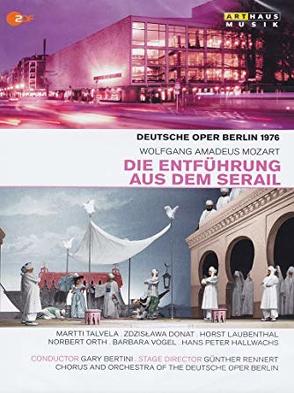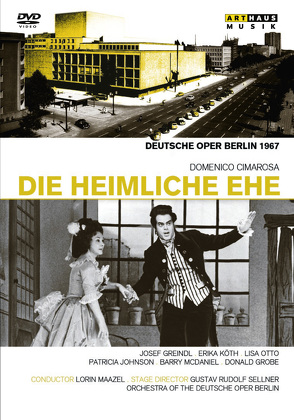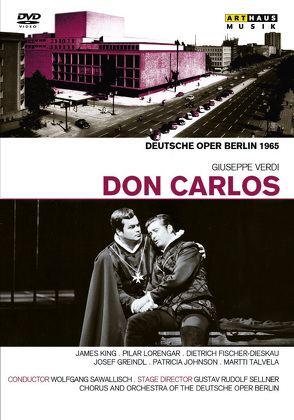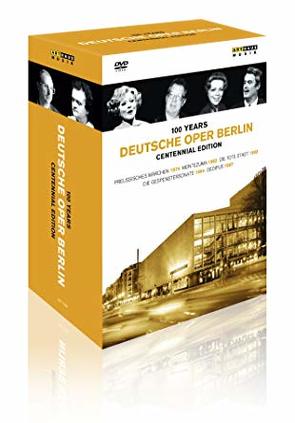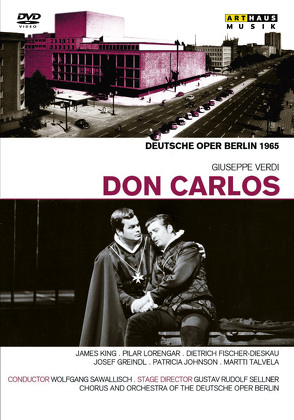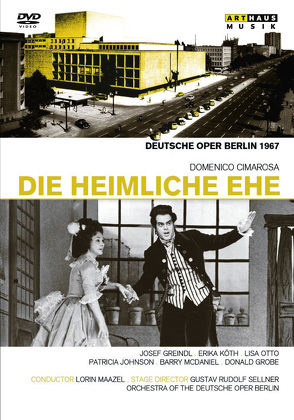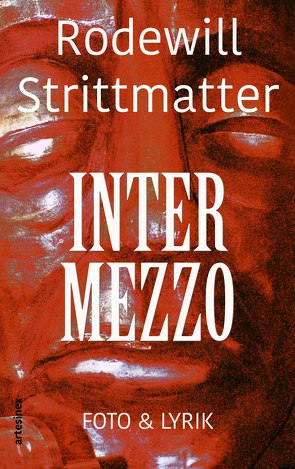
Eva Strittmatters Gedichte im Licht der Deutschen Oper Berlin.
Die Kombination von Lyrik und Fotografie, so lyrisch die Fotografien von Rengha Rodewill sind, so bildhaft ist Strittmatters Lyrik. Requisiten sind jenseits der Bühne nur Gegenstände, die nach der Vorstellung wieder in Regalen und dunklen Kammern verschwinden, aber auf der Bühne bestimmen sie die Emotionen mit und tragen zu einem erfolgreichen Abend bei. In stimmungsvollen Fotos hat die Berliner Künstlerin Rengha Rodewill die verborgenen Welten hinter der Bühne der Deutschen Oper Berlin wieder ans Licht gebracht und mit den zeitlosen Gedichten von Eva Strittmatter in einen Dialog gesetzt, sodass im Spiel der beiden Kunstformen, ein neues ästhetisches Erlebnis entsteht.
Das lange Gedicht »Der junge Stendhal in Paris 1805«, das seine Tagebücher aufnimmt und umsetzt, dazu der »Barlach-Kopf«, der die Oper beherrscht, es hat mich erstaunt und verwundert mich, wie Rengha Rodewill meine Gedichte zu lesen versteht, welch eine Innenwelt sie ihnen abgelesen hat. Der Einbruch der Oper, des Schicksals in meine verborgene Wald-Existenz erhebt mich, schafft mir eine ganz unerwartete Sicht auf meine Gedichte und auf das von mir doch gelebte vergangene Leben. (Vorwort Eva Strittmatter/Auszug).
Eva Strittmatter (1930-2011) ist eine der populärsten und meistgelesenen Lyrikerinnen der Gegenwart. Mit einer Rekordauflage von über zwei Millionen Exemplaren wurden ihre Bücher in 17 Sprachen übersetzt. Die Form ihrer Gedichte besticht durch Einfachheit und Klarheit. Sie veröffentlicht mehr als ein Dutzend Bände mit Gedichten, Prosa und Kinderbüchern.
Der schriftstellerische Nachlass wurde 2015 zusammen mit dem ihres Ehemannes Erwin Strittmatter an die Akademie der Künste in Berlin übergeben.
Aktualisiert: 2023-06-19
> findR *
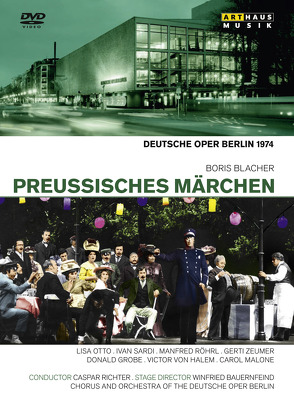
On the surface it is a comic version of the “Hauptmann von Köpenick” story in which it is not the petty thief Wilhelm Voigt who carries off the prank but a respected member of society, the clerk Wilhelm Fadenkreutz. He is not a factory owner like Diederich Heßling, but definitely has many of the characteristics of the hero of “Der Untertan”. Boris Blacher and Heinz von Cramer Cramer quickly realised that such a devastating critique of Germany’s past would not be easy to stage, and they toned down the satirical text before presenting it to the intendant of the Städtische Oper, Heinz Tietjen. Blacher also shortened the caricature of the German national anthem played on the tuba at the start of the piece to make it less recognisable. The authors cast about for a long time for a title for their work that would not conflict with Carl Zuckmayer’s “Der Hauptmann von Köpenick”. After considering “Herrliche Zeiten” (Glorious Times), they finally hit on the idea of combining the local and the fantastical by calling the work “Preußisches Märchen” (A Prussian Fairytale). The premiere on 23 September 1952 in the Theater des Westens, where the Deutsche Oper Berlin ensemble appeared under the title of “Städtische Oper” between 1945 and 1961, was acclaimed by audiences and critics alike.
Aktualisiert: 2023-05-18
> findR *
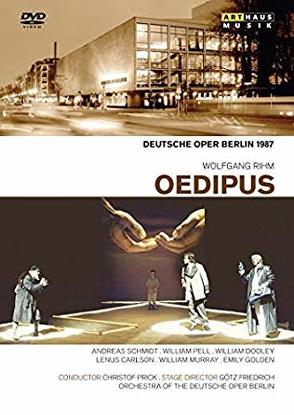
Libretto by Wolfgang Rihm after Friedrich Hölderlin’s translation of Sophokles “Oedipus der Tyrann” and texts by Friedrich Nietzsche and Heiner Müller As one of the most versatile and best-known contemporary German composers, Wolfgang Rihm has always impressed and shocked with the powerful expressiveness of his music. And his “Oedipus”, originally commissioned by the Deutsche Oper Berlin in 1987 has lost nothing of its musical impact over the years. Rihm’s opera – in an impressive production by the intendant and principal director at the time, Götz Friedrich, with baritone Andreas Schmidt (at the start of his international career) in the title role – was praised by audiences and critics alike. Schmidt was subsequently not only much in demand as a performer of the classical repertoire and a lieder recitalist but also gained a reputation for his interpretations of works by other contemporary composers ranging from Hans Werner Henze to Peter Ruzicka. The literary figure of Oedipus – the man who unknowingly killed his father and fathered four children with his mother, thereby fulfilling the prophecy of the oracle – is a staple of western culture. The process by which he develops towards eventual recognition of his guilt is a painful one. In the end, Oedipus punishes himself in a theatrical gesture by gouging out his eyes. With its exploration of the theme of guilt and responsibility it is a legend that never fails to fascinate – and is ideal material for the operatic stage.
Aktualisiert: 2023-05-18
> findR *
Mozart composed his Singspiel “Die Entführung aus dem Serail” in 1781, encouraged by no one less than the Austrian emperor Joseph II in order to emphasise the importance of this “national” form of music theatre as opposed to the Italian opera. It was a great success during Mozart’s lifetime and has until today lost none of its magic. In 1976 the Deutsche Oper Berlin presented a new stage direction, after Gustav Rudolf Sellner’s had been played there for many years, by the renowned Günther Rennert. Besides widely known soloists like Horst Laubenthal and Zdzisława Donat, or the actor Hans Peter Hallwachs as Selim, the star of the evening was undoubtedly the Finnish multi-talented bass Martti Talvela. The premiere in December 1976 was recorded live and broadcast on ZDF (Zweites Deutsches Fernsehen).
Aktualisiert: 2023-05-18
> findR *
Staged by Gustav Rudolf Sellner, conducted by Lorin Maazel, with costumes by Filippo Sanjust and performed by the six soloists with consummate vocal elegance, Cimarosa’s “Die heimliche Ehe” offers unalloyed pleasure, triggering a kind of ecstasy with its combination of delicacy and opulence and its refined humour. It brings out Cimarosa’s musical mastery – but also the visual impact of the opera.
Aktualisiert: 2023-05-18
> findR *
In 1964 Deutsche Oper Berlin still had no General Music Director. But Artistic Director Gustav Rudolf Sellner made a virtue out a necessity and – in addition to the permanent conductor Heinrich Hollreiser and the regular guest conductor Karl Böhm – brought in further conductors from home and abroad for individual productions. For “Don Carlos” he invited Wolfgang Sawallisch, who since 1957 had been making a name for himself at the Bayreuth Festival, above all with “Tannhäuser” and the “Flying Dutchman” and since 1960 had been acting General Music Director in Hamburg. He had at his disposal an ensemble of outstanding soloists. In addition to Josef Greindl and Dietrich Fischer-Dieskau, they included James King in the title role, Pilar Lorengar, Martti Talvela, Patricia Johnson and Lisa Otto as the Voice from Heaven.
Aktualisiert: 2023-05-18
> findR *
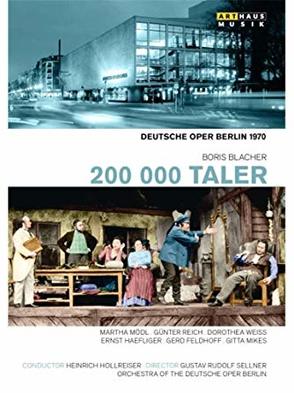
Boris Blacher was one of the most important and most widely performed composers in post-war Germany. In his 1969 opera “200 000 Taler” (200 000 Thalers) he adapted a comedy by famed and popular Jewish author Scholom Aleichem and created a sophisticated milieu study around tailor Schimele Soroker and his family who come to great fortune by winning the lottery.
This 1970 recording of the world premiere production stars a stunning Martha Mödl as Soroker’s wife and Günter Reich in the role of the shrewd tailor. Director Gustav Rudolf Sellner leads his fine cast meticulously through the comic and self-ironic material and supports the cliché-less score that Blacher conceived for Aleichem’s characters. Heinrich Hollreiser conducts the Orchestra of the Deutsche Oper Berlin with insight and musical mastery. As the Neue Zürcher Zeitung wrote after the premiere, “Blacher discovers forces and notions that move our century within the naive, unpretentious literary material at hand. … Without ever using Jewish melodies this score creates a kind of folklore of a setting that is fully Blacher’s own. Here lives a new style.”
Aktualisiert: 2023-05-18
> findR *
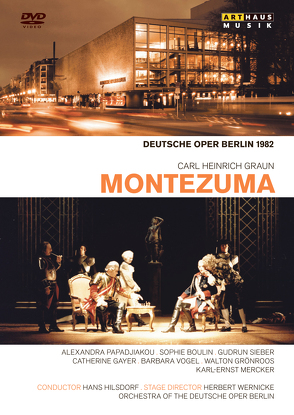
Carl Heinrich Graun (1704–1759) wrote a total of 27 operas for the Berlin court and not least for Frederick II. In 1742 his “Cleopatra e Cesare” was performed at the opening of the “Haus Unter den Linden”, and in 1755 he wrote his most impressive work – “Montezuma”. The opera tells the tragic story of the last ruler of the Aztecs, who lost his power and ultimately his life to the Spanish conquistadores. The libretto, in French prose, was written by none other than the Emperor of Prussia himself – Frederick II – and translated into Italian verse by his court poet. The music, written by his kapellmeister Graun, is as virtuosic as it is expressive – highly rewarding for singers and attractive for audiences. “Montezuma” is an opera that points forward to the future – to Gluck and even to Mozart. In 1982, Deutsche Oper Berlin came to Bayreuth to perform Herbert Wernicke‘s impressive production in the baroque surroundings of the Markgräfliche Opernhaus (opened in 1748).
Aktualisiert: 2023-05-18
> findR *
In 2012 the Deutsche Oper in Berlin had its centennial celebrations. Although today’s building was not opened until 1961, the history of the house on the Bismarckstrasse goes further back: it was built in 1912 and opened as Deutsches Opernhaus upon the initiative of a group of people from Berlin–Charlottenburg as the citizen’s opera in opposition to the Königliche Hofoper, now Staatsoper Unter den Linden. The film illustrates all facets of the different eras of this Berlin opera institution from the beginnings
until today through interviews with artists closely connected to the Deutsche Oper Berlin as well as a large variety of archive footage that also includes documentations of rehearsals and performances from the last 100 years.
Aktualisiert: 2023-05-18
> findR *
Including: Preussisches Märchen // Montezuma // Die tote Stadt // Die Gespenstersonate / Oedipus
For its 100th anniversary the Deutsche Oper Berlin is featured in a special edition of live recordings that were produced since the beginnings of television broadcasts from the opera house. Following the first DVD collection with recordings from the 1960s, this special edition box contains operas from the 1970s and 1980s – treasures in colour featuring great opera singers, stage directors and contemporary composers.
Aktualisiert: 2023-05-18
> findR *
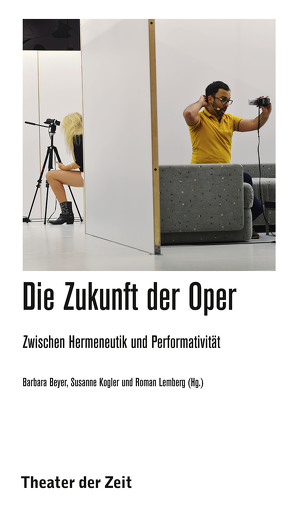
Wie lassen sich die Werke des Opernrepertoires jenseits des "Regietheaters" und ohne fragwürdigen Aktualitätszwang inszenieren? Wie kann Musiktheater für ein Publikum des 21. Jahrhunderts aussehen? Kann das Performative eine weiterführende Dimension ermöglichen - eine Dimension, die Unkontrolliertes zulässt, Erwartungen (ent)täuscht, auf Überraschung und Irritation setzt?
Ein Forschungsprojekt der Kunstuniversität Graz unter der Leitung von Barbara Beyer hat sich über mehrere Jahre theoretisch und praktisch mit diesen Fragen beschäftigt. Am Beispiel von Mozarts Oper "Così fan tutte" wurden von drei jungen Regieteams drei unterschiedliche Herangehensweisen an das Werk erarbeitet und mit drei verschiedenen Ensembles inszeniert. Vorbereitend und begleitend zu den Aufführungen im Oktober 2013 an der Deutschen Oper Berlin fanden Diskussionen, Workshops sowie ein Symposion mit Experten aus Kunst und Wissenschaft statt. "Die Zukunft der Oper - Zwischen Hermeneutik und Performativität" versammelt die Beiträge des Symposions u. a. von Dirk Baecker, Erika Fischer-Lichte, Carl Hegemann und Christine Lemke-Matwey und dokumentiert die drei Opern-Produktionen auf einer beiliegenden DVD.
Aktualisiert: 2023-05-10
> findR *
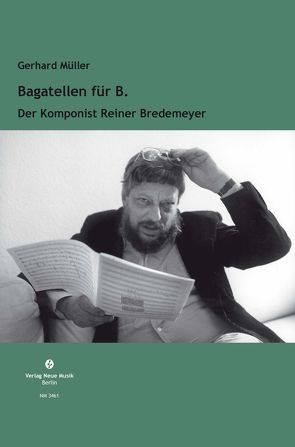
Reiner Bredemeyer (1929–1995) war einer der profiliertesten deutschen Komponisten in der zweiten Hälfte des 20. Jahrhunderts.
Zusammen mit Paul-Heinz Dittrich, Friedrich Goldmann, Georg Katzer und Friedrich Schenker gehörte er zur ironisch so genannten „Fünferbande“ der musikalischen Avantgarde in der DDR, die der konventionellen Musikszene ihr provokatives „Nein“ entgegensetzte. Er gehörte zu den meistgespielten Komponisten seiner Generation, allerdings nicht im Konzertsaal, sondern auf dem Theater. Als Leiter der Schauspielmusik des Deutschen Theaters Berlin schuf und betreute er mehr als drei Jahrzehnte die berühmten Schauspielinszenierungen des Hauses und arbeitete u.a. mit den Regisseuren Wolfgang Langhoff, Benno Besson, Friedo Solter und Adolf Dresen zusammen.
In seinem Werkverzeichnis finden sich unter anderem die parodistische „Galoschenoper“, die Opern „Candide“ nach Voltaire und „Der Neinsager“ nach Brecht, pointierte Orchester- und Kammermusiken und Liederzyklen nach Gedichten von Heinrich Heine, Bertolt Brecht, Ingeborg Bachmann, Erich Fried und Wilhelm Müller („Die Winterreise“ und „Die Schöne Müllerin“).
Die „Bagatellen für B.“, aus Anlass des „Beethoven-Jahres“ 1970 entstanden, wurden sein bekanntestes Orchesterwerk.
Aktualisiert: 2023-03-30
> findR *
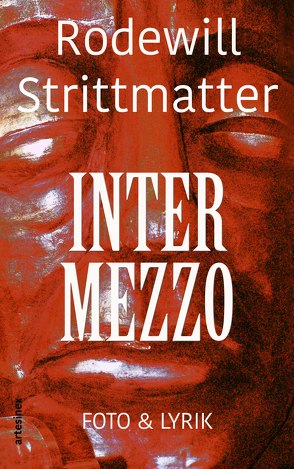
Eva Strittmatters Gedichte im Licht der Deutschen Oper Berlin.
Die Kombination von Lyrik und Fotografie, so lyrisch die Fotografien von Rengha Rodewill sind, so bildhaft ist Strittmatters Lyrik. Requisiten sind jenseits der Bühne nur Gegenstände, die nach der Vorstellung wieder in Regalen und dunklen Kammern verschwinden, aber auf der Bühne bestimmen sie die Emotionen mit und tragen zu einem erfolgreichen Abend bei. In stimmungsvollen Fotos hat die Berliner Künstlerin Rengha Rodewill die verborgenen Welten hinter der Bühne der Deutschen Oper Berlin wieder ans Licht gebracht und mit den zeitlosen Gedichten von Eva Strittmatter in einen Dialog gesetzt, sodass im Spiel der beiden Kunstformen, ein neues ästhetisches Erlebnis entsteht.
Das lange Gedicht »Der junge Stendhal in Paris 1805«, das seine Tagebücher aufnimmt und umsetzt, dazu der »Barlach-Kopf«, der die Oper beherrscht, es hat mich erstaunt und verwundert mich, wie Rengha Rodewill meine Gedichte zu lesen versteht, welch eine Innenwelt sie ihnen abgelesen hat. Der Einbruch der Oper, des Schicksals in meine verborgene Wald-Existenz erhebt mich, schafft mir eine ganz unerwartete Sicht auf meine Gedichte und auf das von mir doch gelebte vergangene Leben. (Vorwort Eva Strittmatter/Auszug).
Eva Strittmatter (1930-2011) ist eine der populärsten und meistgelesenen Lyrikerinnen der Gegenwart. Mit einer Rekordauflage von über zwei Millionen Exemplaren wurden ihre Bücher in 17 Sprachen übersetzt. Die Form ihrer Gedichte besticht durch Einfachheit und Klarheit. Sie veröffentlicht mehr als ein Dutzend Bände mit Gedichten, Prosa und Kinderbüchern.
Der schriftstellerische Nachlass wurde 2015 zusammen mit dem ihres Ehemannes Erwin Strittmatter an die Akademie der Künste in Berlin übergeben.
Aktualisiert: 2023-01-06
> findR *
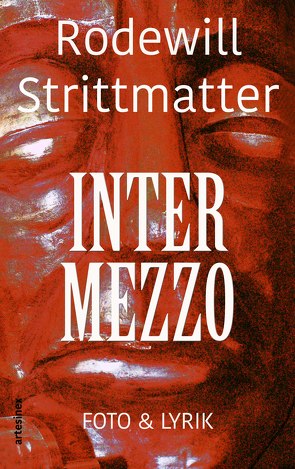
Eva Strittmatters Gedichte im Licht der Deutschen Oper Berlin.
Die Kombination von Lyrik und Fotografie, so lyrisch die Fotografien von Rengha Rodewill sind, so bildhaft ist Strittmatters Lyrik. Requisiten sind jenseits der Bühne nur Gegenstände, die nach der Vorstellung wieder in Regalen und dunklen Kammern verschwinden, aber auf der Bühne bestimmen sie die Emotionen mit und tragen zu einem erfolgreichen Abend bei. In stimmungsvollen Fotos hat die Berliner Künstlerin Rengha Rodewill die verborgenen Welten hinter der Bühne der Deutschen Oper Berlin wieder ans Licht gebracht und mit den zeitlosen Gedichten von Eva Strittmatter in einen Dialog gesetzt, sodass im Spiel der beiden Kunstformen, ein neues ästhetisches Erlebnis entsteht.
Das lange Gedicht »Der junge Stendhal in Paris 1805«, das seine Tagebücher aufnimmt und umsetzt, dazu der »Barlach-Kopf«, der die Oper beherrscht, es hat mich erstaunt und verwundert mich, wie Rengha Rodewill meine Gedichte zu lesen versteht, welch eine Innenwelt sie ihnen abgelesen hat. Der Einbruch der Oper, des Schicksals in meine verborgene Wald-Existenz erhebt mich, schafft mir eine ganz unerwartete Sicht auf meine Gedichte und auf das von mir doch gelebte vergangene Leben. (Vorwort Eva Strittmatter/Auszug).
Eva Strittmatter (1930-2011) ist eine der populärsten und meistgelesenen Lyrikerinnen der Gegenwart. Mit einer Rekordauflage von über zwei Millionen Exemplaren wurden ihre Bücher in 17 Sprachen übersetzt. Die Form ihrer Gedichte besticht durch Einfachheit und Klarheit. Sie veröffentlicht mehr als ein Dutzend Bände mit Gedichten, Prosa und Kinderbüchern.
Der schriftstellerische Nachlass wurde 2015 zusammen mit dem ihres Ehemannes Erwin Strittmatter an die Akademie der Künste in Berlin übergeben.
Aktualisiert: 2023-04-15
> findR *
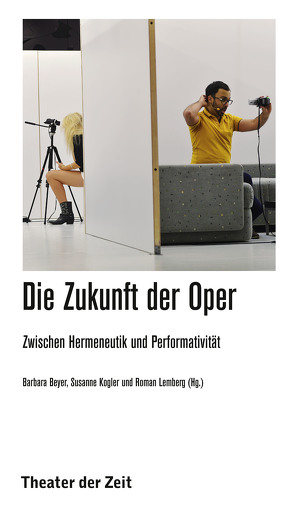
Wie lassen sich die Werke des Opernrepertoires jenseits des "Regietheaters" und ohne fragwürdigen Aktualitätszwang inszenieren? Wie kann Musiktheater für ein Publikum des 21. Jahrhunderts aussehen? Kann das Performative eine weiterführende Dimension ermöglichen - eine Dimension, die Unkontrolliertes zulässt, Erwartungen (ent)täuscht, auf Überraschung und Irritation setzt?
Ein Forschungsprojekt der Kunstuniversität Graz unter der Leitung von Barbara Beyer hat sich über mehrere Jahre theoretisch und praktisch mit diesen Fragen beschäftigt. Am Beispiel von Mozarts Oper "Così fan tutte" wurden von drei jungen Regieteams drei unterschiedliche Herangehensweisen an das Werk erarbeitet und mit drei verschiedenen Ensembles inszeniert. Vorbereitend und begleitend zu den Aufführungen im Oktober 2013 an der Deutschen Oper Berlin fanden Diskussionen, Workshops sowie ein Symposion mit Experten aus Kunst und Wissenschaft statt. "Die Zukunft der Oper - Zwischen Hermeneutik und Performativität" versammelt die Beiträge des Symposions u. a. von Dirk Baecker, Erika Fischer-Lichte, Carl Hegemann und Christine Lemke-Matwey und dokumentiert die drei Opern-Produktionen auf einer beiliegenden DVD.
Aktualisiert: 2023-02-14
> findR *
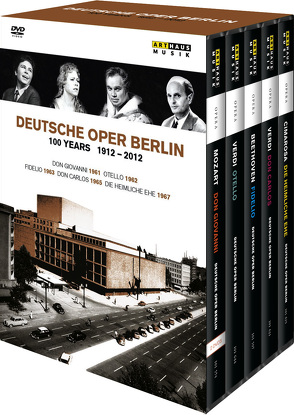
For its 100th anniversary the Deutsche Oper Berlin presents a special edition of live recordings – from the beginnings of television broadcasts from the opera house. This special edition box contains the live recordings from the 1960s – treasures in black and white featuring the greatest opera stars of the 20th century in unforgotten roles and settings.
On 24 September 1961 „Sender Freies Berlin“ (SFB, now RBB) presented the re-opening of the Deutsche Oper Berlin with Mozart’s “Don Giovanni” on television. It was the first transmission of an opera by SFB, which had been founded seven years before. Television productions of performances from the Deutsche Oper Berlin became frequent, practically annual afterwards. However most of these partly legendary recordings have not been shown for decades: the outdated policy of the broadcasting stations ensuring them only limited transmission rights
of the performers resulted in these recordings being locked away in the archives, labelled as restricted or “protected”, and therewith concealing them from the eyes and ears of the public. Three years ago Deutsche Oper Berlin and Arthaus Musik, in apprehension of the 100 years jubilee of the opera house, decided to leave nothing unattempted in order to liberate the recordings from their coma in the archives and to select the most important ones for an extensive DVD edition. It took two years of research, discussions and negotiations with the performers of those productions (or their heirs) as well as to some extent complex and elaborate restorations on the film material, until the first recording in this series, the opening performance of Mozart’s “Don Giovanni” from 1961, was released. In the meantime the series includes six recordings, and at least five more are to follow.
Aktualisiert: 2021-12-13
> findR *
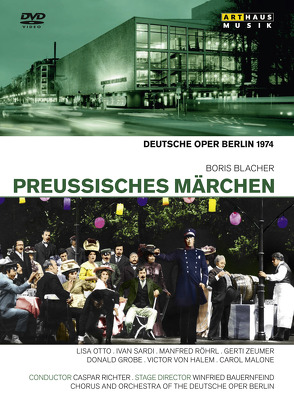
On the surface it is a comic version of the “Hauptmann von Köpenick” story in which it is not the petty thief Wilhelm Voigt who carries off the prank but a respected member of society, the clerk Wilhelm Fadenkreutz. He is not a factory owner like Diederich Heßling, but definitely has many of the characteristics of the hero of “Der Untertan”. Boris Blacher and Heinz von Cramer Cramer quickly realised that such a devastating critique of Germany’s past would not be easy to stage, and they toned down the satirical text before presenting it to the intendant of the Städtische Oper, Heinz Tietjen. Blacher also shortened the caricature of the German national anthem played on the tuba at the start of the piece to make it less recognisable. The authors cast about for a long time for a title for their work that would not conflict with Carl Zuckmayer’s “Der Hauptmann von Köpenick”. After considering “Herrliche Zeiten” (Glorious Times), they finally hit on the idea of combining the local and the fantastical by calling the work “Preußisches Märchen” (A Prussian Fairytale). The premiere on 23 September 1952 in the Theater des Westens, where the Deutsche Oper Berlin ensemble appeared under the title of “Städtische Oper” between 1945 and 1961, was acclaimed by audiences and critics alike.
Aktualisiert: 2021-05-18
> findR *
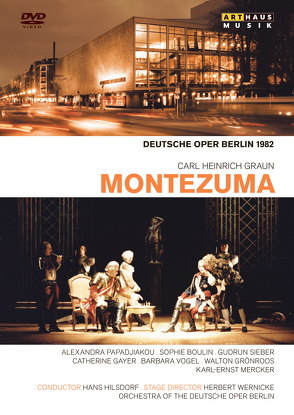
Carl Heinrich Graun (1704–1759) wrote a total of 27 operas for the Berlin court and not least for Frederick II. In 1742 his “Cleopatra e Cesare” was performed at the opening of the “Haus Unter den Linden”, and in 1755 he wrote his most impressive work – “Montezuma”. The opera tells the tragic story of the last ruler of the Aztecs, who lost his power and ultimately his life to the Spanish conquistadores. The libretto, in French prose, was written by none other than the Emperor of Prussia himself – Frederick II – and translated into Italian verse by his court poet. The music, written by his kapellmeister Graun, is as virtuosic as it is expressive – highly rewarding for singers and attractive for audiences. “Montezuma” is an opera that points forward to the future – to Gluck and even to Mozart. In 1982, Deutsche Oper Berlin came to Bayreuth to perform Herbert Wernicke‘s impressive production in the baroque surroundings of the Markgräfliche Opernhaus (opened in 1748).
Aktualisiert: 2021-05-19
> findR *
In 1964 Deutsche Oper Berlin still had no General Music Director. But Artistic Director Gustav Rudolf Sellner made a virtue out a necessity and – in addition to the permanent conductor Heinrich Hollreiser and the regular guest conductor Karl Böhm – brought in further conductors from home and abroad for individual productions. For “Don Carlos” he invited Wolfgang Sawallisch, who since 1957 had been making a name for himself at the Bayreuth Festival, above all with “Tannhäuser” and the “Flying Dutchman” and since 1960 had been acting General Music Director in Hamburg. He had at his disposal an ensemble of outstanding soloists. In addition to Josef Greindl and Dietrich Fischer-Dieskau, they included James King in the title role, Pilar Lorengar, Martti Talvela, Patricia Johnson and Lisa Otto as the Voice from Heaven.
Aktualisiert: 2021-05-18
> findR *
Staged by Gustav Rudolf Sellner, conducted by Lorin Maazel, with costumes by Filippo Sanjust and performed by the six soloists with consummate vocal elegance, Cimarosa’s “Die heimliche Ehe” offers unalloyed pleasure, triggering a kind of ecstasy with its combination of delicacy and opulence and its refined humour. It brings out Cimarosa’s musical mastery – but also the visual impact of the opera.
Aktualisiert: 2021-05-19
> findR *
MEHR ANZEIGEN
Bücher zum Thema Deutsche Oper Berlin
Sie suchen ein Buch über Deutsche Oper Berlin? Bei Buch findr finden Sie eine große Auswahl Bücher zum
Thema Deutsche Oper Berlin. Entdecken Sie neue Bücher oder Klassiker für Sie selbst oder zum Verschenken. Buch findr
hat zahlreiche Bücher zum Thema Deutsche Oper Berlin im Sortiment. Nehmen Sie sich Zeit zum Stöbern und finden Sie das
passende Buch für Ihr Lesevergnügen. Stöbern Sie durch unser Angebot und finden Sie aus unserer großen Auswahl das
Buch, das Ihnen zusagt. Bei Buch findr finden Sie Romane, Ratgeber, wissenschaftliche und populärwissenschaftliche
Bücher uvm. Bestellen Sie Ihr Buch zum Thema Deutsche Oper Berlin einfach online und lassen Sie es sich bequem nach
Hause schicken. Wir wünschen Ihnen schöne und entspannte Lesemomente mit Ihrem Buch.
Deutsche Oper Berlin - Große Auswahl Bücher bei Buch findr
Bei uns finden Sie Bücher beliebter Autoren, Neuerscheinungen, Bestseller genauso wie alte Schätze. Bücher zum
Thema Deutsche Oper Berlin, die Ihre Fantasie anregen und Bücher, die Sie weiterbilden und Ihnen wissenschaftliche
Fakten vermitteln. Ganz nach Ihrem Geschmack ist das passende Buch für Sie dabei. Finden Sie eine große Auswahl
Bücher verschiedenster Genres, Verlage, Autoren bei Buchfindr:
Sie haben viele Möglichkeiten bei Buch findr die passenden Bücher für Ihr Lesevergnügen zu entdecken. Nutzen Sie
unsere Suchfunktionen, um zu stöbern und für Sie interessante Bücher in den unterschiedlichen Genres und Kategorien
zu finden. Unter Deutsche Oper Berlin und weitere Themen und Kategorien finden Sie schnell und einfach eine Auflistung
thematisch passender Bücher. Probieren Sie es aus, legen Sie jetzt los! Ihrem Lesevergnügen steht nichts im Wege.
Nutzen Sie die Vorteile Ihre Bücher online zu kaufen und bekommen Sie die bestellten Bücher schnell und bequem
zugestellt. Nehmen Sie sich die Zeit, online die Bücher Ihrer Wahl anzulesen, Buchempfehlungen und Rezensionen zu
studieren, Informationen zu Autoren zu lesen. Viel Spaß beim Lesen wünscht Ihnen das Team von Buchfindr.



